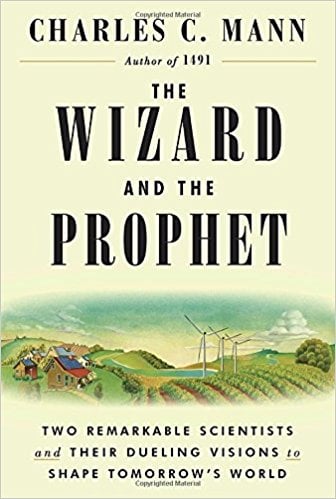You have /5 articles left.
Sign up for a free account or log in.
 The Wizard and the Prophet: Two Remarkable Scientists and Their Dueling Visions to Shape Tomorrow's World by Charles C. Mann
The Wizard and the Prophet: Two Remarkable Scientists and Their Dueling Visions to Shape Tomorrow's World by Charles C. Mann
Published in January of 2018.
It is a safe bet that Charles C. Mann’s The Wizard and the Prophet will be on most best book lists of 2018. Yes, we have a long way to go in 2018 - but it is difficult to imagine that many books will top Mann’s for ambition, eloquence, scope, and quality of execution. The Wizard and the Prophet is an exceptional achievement, one that I believe will ultimately rank as one of the most important works of nonfiction of the decade.
On it own terms, this is a book that I think our IHE community will find both relevant and timely. In higher education we take seriously the marketplace for ideas. There is perhaps no more important debate than how our planet will find the food and energy to support the 10 billion or so people expected to populate the earth by 2050.
Mann explores the essential questions of environmental sustainability, food security, and energy consumption through the biographies of Norman Bourlag (the Wizard) and William Vogt (the Prophet).
Bourlag is likely well known by our IHE community, but not outside of our networks. I had thought that I knew the story of Bourlag and the Green Revolution that he initiated. Of the billion or so people that this Nobel Prize winning scientist saved through his work on high yield / disease resistant wheat and rice. What I did not know is the full extent of Bourlag’s triumph, or the controversies that continue to swirl around the Green Revolution.
William Vogt, the ecologist who coined the term carrying capacity and who was an early thinker in the environmentalist movement, was a character I did not know. Much of the thinking of subsequent ecological thinkers, from Paul Ehrlich (The Population Bomb) to Al Gore (An Inconvenient Truth), can be traced back to the writing of Vogt.
What makes The Wizard and the Prophet such a wonderful and important book is in the ways in which Mann’s work helps us make sense of issues beyond the environment, energy, and agriculture. It seems to me that much of our conversation, and our debate, about the role of technology in education comes down to the differences in how Wizards and Prophets see the world.
Wizards believe that we can leverage technology to move quality education from scarcity to abundance. They believe that it is a moral failing that education - and particularly higher education - most often serves to concentrate rather than ameliorate economic and social advantages. Through investing in new technologies, pedagogies, and methods, (from online learning to adaptive learning platforms - all informed by learning analytics), that we can access, lower costs, and raise quality.
Prophets, conversely, believe that education is a social process - and therefore not easily amenable to technical solutions. Prophets view much of the desire to inject technology into education as an effort to justify public disinvestment, to disempower educators, and to treat learners as consumers.
In The Wizard and the Prophet, Mann does a wonderful job of illuminating both the brilliance and blind spots of Wizards and Prophets. He steadfastly refused to pick a side, instead letting the reader decide where their sympathies should lie.
We need a similar sort of fair-minded treatment for the Wizards and the Prophets of our own world creating the future of higher education.
Do you have any early candidates for the best book of 2018?
What are you reading?




